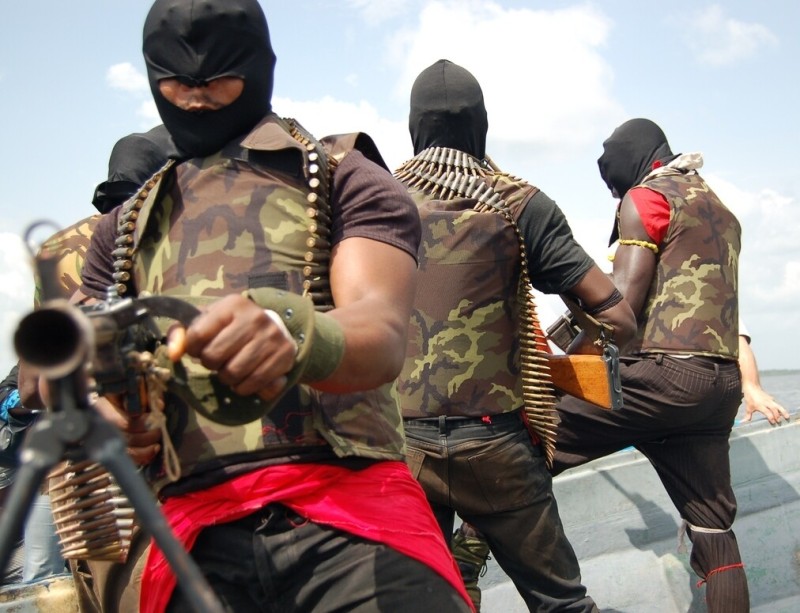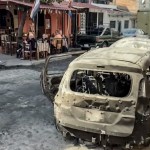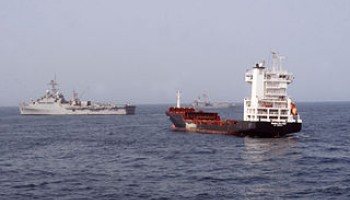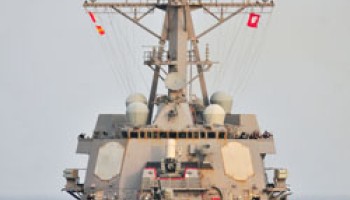That Sunday, December 15, 2019, the MV Duke was traversing the Gulf of Guinea on its way from Luanda, Angola to Lomé, Togo, where it was to anchor in the afternoon. Captain Prasad had planned to be just in time to catch a flight home to India so he could see his son blow out the candles on his birthday cake.
“I was on the bridge within a few seconds and looking out we could see heads and automatic weapons popping out,” the Captain recalls. “It was a fast boat, about 30 knots, while we were only doing about 10 knots.”
The MV Duke, a chemical tanker, was going at its maximum speed.
“There was no way we could outrun them,” Prasad said.
The pirates caught up with them within minutes, shouting for the boat to slow down. Prasad had no choice but to retreat with his crew into the ship’s fortified citadel room.
“We were terrified, hell had broken loose and we were shit scared, I had never seen so many weapons in my life,” he said. “I tried to calm down my crew, I told them to pray and not make any funny moves.”
The crew did a headcount and found that one man was missing. Prasad had to think fast. If the pirates had captured that missing crew member, there was only one way to save his life.
He walked out with his hands in the air.
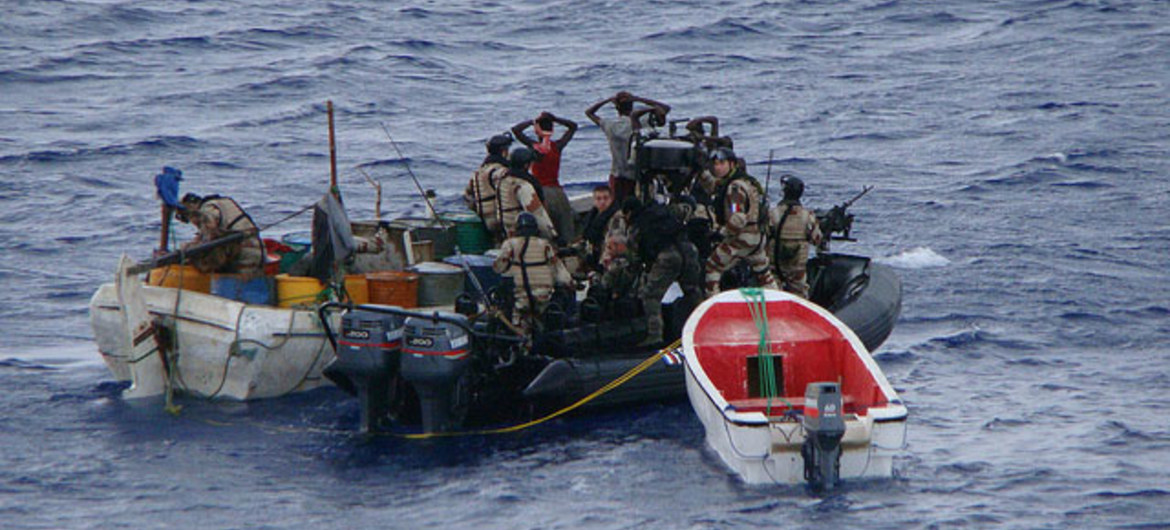 A group of suspected pirates are apprehended by EUNAVFOR elements in the Gulf of Guinea. (Credit: UN)
A group of suspected pirates are apprehended by EUNAVFOR elements in the Gulf of Guinea. (Credit: UN)
NEW HOTSPOT
The plundering and hijacking of ships in the high seas is as old as the maritime trade, and has often been romanticized. But pirates of the 21st century are a far cry from the Walt Disney creations of a handsome Jack Sparrow and the Black Pearl’s odyssey through the Caribbean.
Today’s pirates are known as Kalashnikov-toting youth speeding in little boats toward giant ships off the coast of Somalia.
In the last few years, however, the coast of West Africa, and specifically The Gulf of Guinea, has replaced the Horn of Africa as the most dangerous region in the world when it comes to maritime piracy.
In 2019, the West African coast saw nearly 100 attacks, according to a report by Stable Seas, a program of the One Earth Future foundation researches illicit maritime activities such as piracy, armed robbery, human trafficking and smuggling.
In the first quarter of 2020, before the onset of the global coronavirus pandemic, the International Maritime Bureau (IMB) has recorded a nearly 20 percent increase in piracy incidents around the world compared to the same period last year.
The bureau also noted that not a single incident occurred off the coast in Somalia during this year’s first quarter.
Other regions known for piracy, such as the Singapore Strait, have also seen decreases. The Gulf of Guinea, on the other hand, had more than 50 attacks against vessels between January and June, according to the IMB’s Piracy Reporting Centre.
The first week of May was the worst period. In less than 48 hours, three attacks led to 16 kidnapped men who were likely going through an ordeal very similar to that faced by Captain Prasad and his crew.
NEW TARGET
When the pirates embarked the MV Duke, they went around interrogating the crew to make sure there were no armed guards on board. They looted the cabins for cash and personal belongings but didn’t check the cargo.
They were after the human capital.
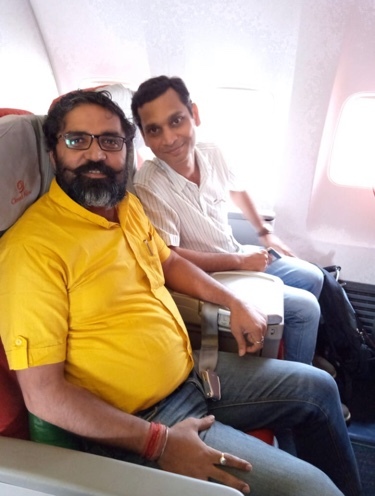 Captain Ripusad Prasad, on the left, flying home from Nigeria with his chief engineer. (Credit: Ripusad Prasad)
Captain Ripusad Prasad, on the left, flying home from Nigeria with his chief engineer. (Credit: Ripusad Prasad)
East-African pirates would capture whole ships, as they could store them at docks in relatively lawless Somalian ports to be ransomed. The sovereign nations of West Africa, however, have stronger law enforcement and the pirates there just capture the crew, who are easily transported and hidden on land.
In the eyes of the pirates, the value of human cargo varies, as with other traded goods — and, according to Prasad, this is the same for the shipping companies, which are responsible for negotiating the prisoners’ release.
His crew comprised 20 Indian nationals and one Nigerian man. At first, the pirates threatened to kill the Nigerian because he was the only crew member wearing a uniform, which led them to believe he was an armed guard. But after learning he was just a cadet, a ship trainee, they just left him behind.
The pirates said that “a black life has no value compared to a brown one and a white one is the most valuable,” Captain Prasad cited.
“This is an open secret,” he added. ”I am not ashamed of being a brown man, but the world looks different to different races.”
If one or two white people, preferably British citizens, had been part of the crew, it wouldn’t have taken the company that owns the ship five weeks to pay for their release, he said.
However, experience from previous cases in The Horn of Africa shows that white hostages have sometimes spent years in captivity because the kidnappers could not agree on the ransom with the shipping companies or families.
The pirates took their hostages to a supply vessel — a common ship type in the Gulf and therefore inconspicuous — and after almost 30 hours, transported them to a camp in the jungle near the Niger Delta.
“They frightened us only on the MV Duke,” Prasad recalls.
“Once we were on their ship and under their control, they treated us nicely,” he said. “They tried to console us, and told us when our company meets their demands we’ll be out of there.”
“It was clear we were now valuable to them,” he added.
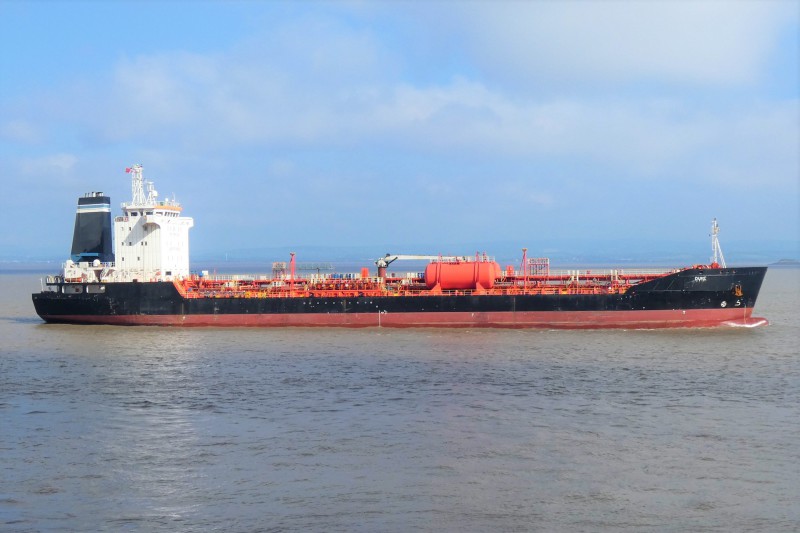 The MV Duke, the ship Captain Prasad and his crew were kidnapped from. (Credit: jeffess / ShipSpotting.com)
The MV Duke, the ship Captain Prasad and his crew were kidnapped from. (Credit: jeffess / ShipSpotting.com)
Once in the jungle camp, Prasad and his crew met the leader of the gang, who was only called by his nom-de-guerre: “Ghaddaffi.”
From his manner and ease of command it was clear to Prasad that this man had military experience.
“What I came to know is that he used to work for the Governor of Biafra,” Prasad said, referring to a coastal province in Nigeria.
WHY THE GULF?
The Gulf of Guinea has a variety of factors that make it ripe for piracy, according to Stable Seas.
Some 20 nations line the Gulf’s 6,000 miles of coastline, many of whom are beset by poverty, high rates of corruption and weak rule of law, making cooperation among them difficult.
The Gulf nations have many natural resources such as oil, minerals, and offshore hydrocarbon. They boast a sustainable “blue economy” of fisheries as well as other maritime industries. Nigeria is even listed as Africa's largest economy.
However, the Gulf’s natural wealth and economic successes often don’t trickle down to the inhabitants of coastal villages and widespread corruption contributes to poverty in those communities.
The fishing trade has historically been passed down from one generation to the next. But the growth of industrial fishing in the region has pushed many of the traditional fishers out of work. For them, piracy is a lucrative alternative.
“If we look at it from a slightly humanitarian perspective, these people are doing what they are doing because they believe they have to,” said Cyrus Mody, assistant director of the International Chamber of Commerce’s Commercial Crime Services division that oversees the IMB.
“They do come from areas of extreme poverty and extreme corruption, where they have probably lost jobs and their skills are maritime skills,” Mody said. “So what they do is go out and steal from other ships.”
“I’m not in any way saying what they do is correct but this is the reality on the water,” Mody said.
But piracy is creating a downward spiral, further deteriorating the legitimate economies.
“It affects trade in the region and thus affects the economy of all the coastal states where this crime takes place,” Mody said.
The rise of piracy can also be attributed to a lack of anti-crime measures, according to Stable Seas.
“Not a single country in the Gulf of Guinea has domesticated all provisions of [the United Nations Convention against Transnational Organized Crime], a fundamental framework designed to address all transnational organized crimes including piracy, Illegal, unreported, and unregulated fishing, illegal migration, and narcotics trafficking, which are all pervasive in the region,” according to the Stable Seas report.
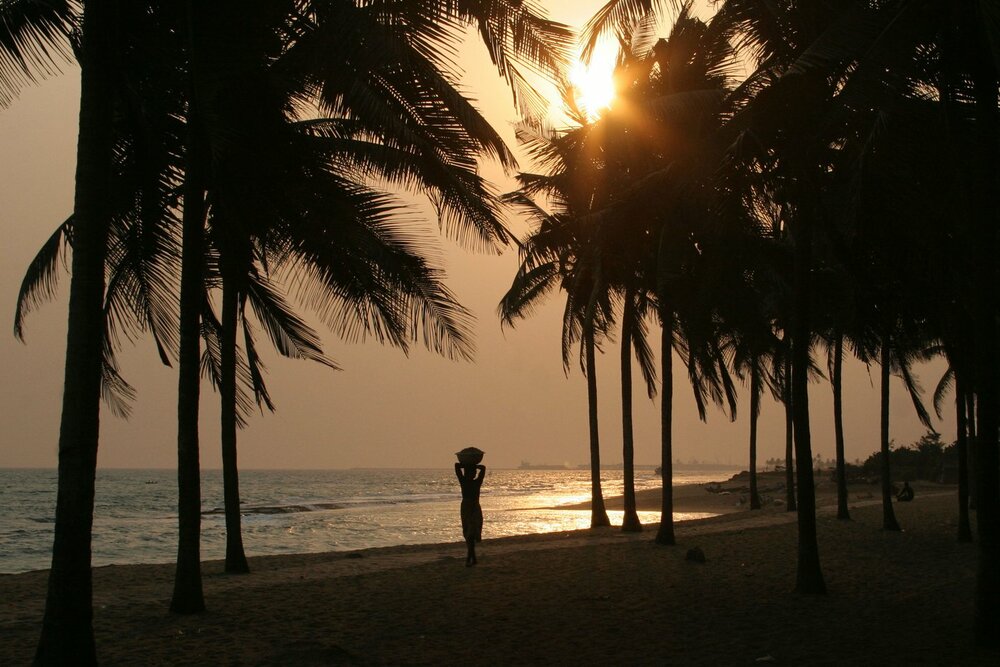 Silhouetted palm trees and a woman carrying a basket on the beach at Lomé, Togo in the Gulf of Guinea. (Credit: Arterra Picture Library / Alamy Stock Photo)
Silhouetted palm trees and a woman carrying a basket on the beach at Lomé, Togo in the Gulf of Guinea. (Credit: Arterra Picture Library / Alamy Stock Photo)
IN THE JUNGLE
The camp where Prasad and his crew were being held had very sparse amenities.
While there were tents, the hostages slept on the ground outside. Eventually they were brought a few mattresses.
“After three or four days they started giving us two meals a day,” Prasad said. “Noodles in the morning and rice and beans in the evening: This was our routine for 35 days.”
 Captain Ripusad Prasad reunited with his wife in India. (Credit: Ripusad Prasad)
Captain Ripusad Prasad reunited with his wife in India. (Credit: Ripusad Prasad)
One of Prasad’s crewmates had contracted an infection on the transport vessel, and in the spartan conditions of the jungle camp his condition started to deteriorate. The pirates brought in a medic to take a look at him, but there was little he could do.
“Unfortunately, on the 23rd of December, in the early morning we lost him.” Prasad said.
The pirates buried his body in the jungle without ceremony. Prasad was wary of telling his crew of the death, in fear that it would demoralize them.
One of the biggest challenges in the jungle was monotony. A small break came on Christmas, when the pirates had a feast. They hunted a monkey, thinking it would be a treat for the hostages, but even after 10 days of nothing but rice and noodles, the Indian crewmen still could not stomach the meat of the animal.
The pirates' demands initially started at one billion naira or about US$3 million for the 20 crewmen. After weeks of negotiations with the Edinburgh company that owned the ship, Union Maritime Limited, they settled on $300,000.
While for Union Maritime the ordeal may be over, months after their five weeks in captivity, Captain Prasad and his crew still don’t know if they will ever be ready to sail again.
Besides the physical and mental anguish they went through themselves, their families at home in India are also left traumatized, making it even harder for the crew to feel positive about embarking again.
“Who duped us?” Prasad wonders. He believes that the British company did not really care about the crew.
“The owners did not care, their ship was released. The owners told us the managers, they were the ones negotiating, the managers said no it was the owners, all the while our lives were hanging in the balance,“ he says.
The compensation each crewmember received from the shipping company for their ordeal: $1,400.
And for the family of the crewmember who died in the jungle? Nothing, according to Captain Prasad. With no body, there is no death certificate. No death certificate — no money.
